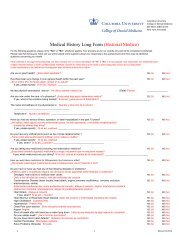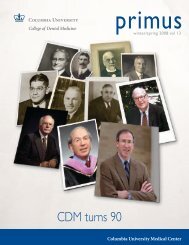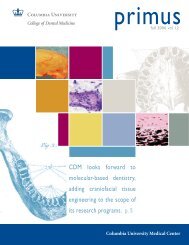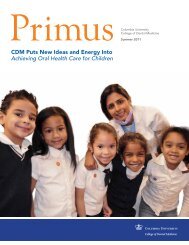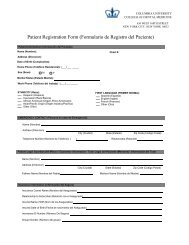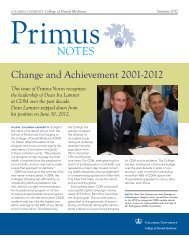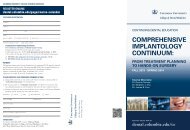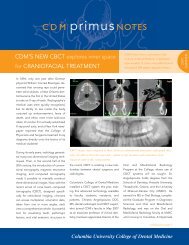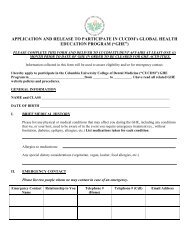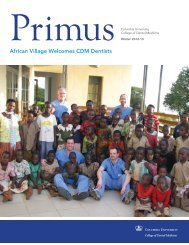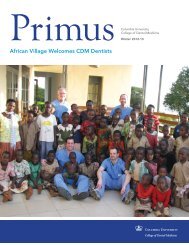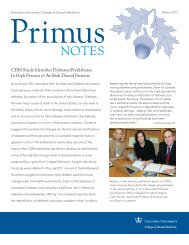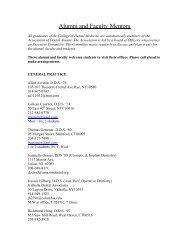Jarvie Journal - College of Dental Medicine - Columbia University
Jarvie Journal - College of Dental Medicine - Columbia University
Jarvie Journal - College of Dental Medicine - Columbia University
You also want an ePaper? Increase the reach of your titles
YUMPU automatically turns print PDFs into web optimized ePapers that Google loves.
The <strong>Journal</strong> <strong>of</strong> the William <strong>Jarvie</strong> Society<br />
Assessing <strong>Dental</strong> Students’ Attitudes, Knowledge, and Intentions toward<br />
Treating Young Children<br />
Kelly F. Walk 1 , Tener Huang 2 , Carol Kunzel 3*<br />
1 <strong>Columbia</strong>-New York Presbyterian Hospital, Residency Program in Pediatric Dentistry,<br />
2 <strong>Columbia</strong> <strong>University</strong> <strong>College</strong> <strong>of</strong> <strong>Dental</strong> <strong>Medicine</strong>, New York, NY;<br />
3 Section <strong>of</strong> Social and Behavioral Sciences, <strong>College</strong> <strong>of</strong> <strong>Dental</strong> <strong>Medicine</strong>, <strong>Columbia</strong> <strong>University</strong>, * Faculty Mentor<br />
Introduction: There is an increasing caries rate in young children in the U.S., with many children having untreated<br />
decay, and with a disproportionate number <strong>of</strong> these living in poverty. Seemingly there is a need for an increased<br />
number <strong>of</strong> general dentists to be more comfortable and willing to treat young children and those on Medicaid. Most<br />
dental schools do not provide a hands-on training experience aimed at fostering an improvement in this area.<br />
Objective: The purpose <strong>of</strong> this study was (1) to assess dental students’ knowledge, confidence, attitudes, and<br />
intention (KCAI) to treat young children and Medicaid patients, and (2) to evaluate change in KCAI after<br />
participation in an intervention including a hands-on training experience.<br />
Materials & Methods: A 27-item questionnaire was administered to <strong>Columbia</strong> <strong>University</strong> third- and fourth-year<br />
dental students (D3, D4, respectively), that collected information on demographics, knowledge, confidence,<br />
attitudes, and intentions to treat infants and toddlers (defined as 0-36 months old) and those on Medicaid.<br />
Knowledge questions pertained to infant oral health including caries, diet, hygiene, and treatment. Following this<br />
survey, a portion <strong>of</strong> the D3 and D4 students voluntarily participated in a 1-hour infant oral health seminar and 3-<br />
hour clinical experience providing dental examinations to young children and engaging with parents at a Head<br />
Start. These students completed the same survey one month later to assess for changes in KCAI. Students were<br />
excluded if they had previously participated in the intervention. Comparisons between pre- and post-test results<br />
were analyzed using Wilcoxon rank-sum and t-tests.<br />
Results & Conclusions: Of 153 eligible students, 127 completed the initial questionnaire and 34 completed the<br />
post-test questionnaire after participating in the intervention. In the initial survey, 37% <strong>of</strong> students reported their<br />
infant oral health knowledge as “good or very good;” while 20% felt confident to perform a dental examination on<br />
an infant or toddler. Although 94% felt it was important for general dentists to be able to treat young children, 33%<br />
planned to provide preventive care to young children “<strong>of</strong>ten or very <strong>of</strong>ten,” and 24% if the children had Medicaid.<br />
Hands-on clinical program participants felt that “inadequate training as a barrier to treating young children” was<br />
significantly less likely after completing the intervention (p=.037). In addition they felt more confident (p



